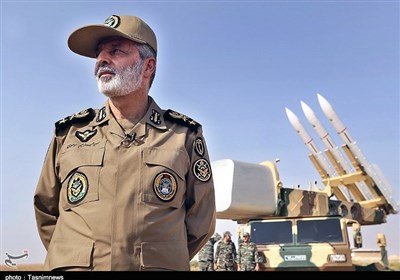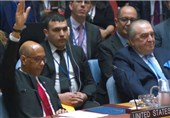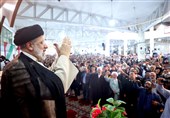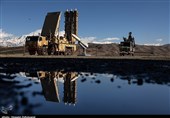Trumps’ Stance on Iran’s IRGC Not Serving Americans’ Interests: Ex-US Diplomat
TEHRAN (Tasnim) – A former US diplomat and Senate foreign policy adviser denounced President Donald Trump’s recent comments against Iran and the Islamic Revolution Guards Corps (IRGC) and said such stance only serves the interests of the Saudi and Israeli regimes, not the Americans.
“Two of the most powerful foreign lobbies in Washington are those of Israel and Saudi Arabia, which are increasingly linked based on their shared hostility to Iran,” Washington-based political analyst James Jatras said in an interview with the Tasnim News Agency.
“It is significant that Trump’s first two destinations abroad were to Saudi Arabia and Israel,” the former US diplomat noted.
“While President Trump ran on an ‘America First!’ platform promising to put US interest before those of foreign countries, he seems to be entirely following the tendencies of his predecessors to put foreign interests first,” he noted.
James George Jatras is Deputy Director of the American Institute in Ukraine, a privately funded American NGO. Based in Washington, DC, he is a former US diplomat and adviser to the US Senate Republican leadership.
The full text of the interview with Jatras is as follows:
Tasnim: As you know, US President Donald Trump, who faced an Oct. 15 deadline to tell Congress whether it will continue to certify that Iran is complying with the 2015 nuclear deal with six world powers, also known as the Joint Comprehensive Plan of Action (JCPOA), on Friday refused to certify the multilateral deal. Now, the US Congress will have 60 days to decide whether to re-impose sanctions against Iran. What would the US withdrawal from the deal signal to the international community?
Jatras: President Trump has decertified the deal, as expected, but has not withdrawn the US from the JCPOA. The next step is up to Congress, whether to re-impose sanctions lifted under the agreement. If they do so, that would effectively mean the US is withdrawing from the deal, whether or not there is a formal repudiation of US participation. If that happens, it would not automatically nullify the JCPOA, which would remain in place between Iran and the other parties: the UK, France, Germany, Russia, China, and the EU. However, based on my conversations today on Capitol Hill, rather than immediately restoring sanctions it is more likely Congress will pass some sort of interim measure condemning Iran for the usual list of “bad behavior” – mostly untrue, and mostly not related to nuclear weapons development – with a trigger at some point in the future, perhaps in one year. Keep in mind that Democrats, even those deeply hostile to Iran, will wish to preserve what may be Barack Obama’s only significant foreign policy achievement from his time in office and will be loath to endorse the action of a president they hate. Many Republicans, much as they railed against Obamacare for seven years but then fumbled when they had an opportunity to repeal it, will find it easier to sound belligerent than to take a real action that might have consequences. If Congress does not re-impose sanctions within the 60-day window, that effectively means the US will formally remain within the JCPOA despite the decertification. This may well be what Trump intended – a way to look strong and hairy-chested and to appease the partisans of Israel and Saudi Arabia while leaving responsibility for staying in the agreement with Congress.
Tasnim: Trump’s stance against the JCPOA is in stark contrast to other parties to the deal. Envoys from the European Union, Germany, France and Britain have declared that the JCPOA is working and Iran is complying with the agreement. What is your assessment of the comments?
Jatras: If the US does, in fact, pull out of the JCPOA, or re-impose sanctions (which amounts to the same thing), I doubt that even our favorite poodle, the United Kingdom, would follow the American lead. While France can be unpredictable at times, and President Macron likes to pretend he is a leader of the stature of De Gaulle, I don’t think Paris will want to break with London, Berlin, and Brussels. The position of Russia and China is obvious. So even if the US did leave the JCPOA – which as noted, I don’t think we will, though the possibility can’t be ruled out – it would be up to Iran to decide if pulling out of the agreement to which all the other parties except the US remained committed were in her national interest. In my opinion, that would be a foolish move and Iran would gain nothing from it. First, Iran has repeatedly said she does not wish to develop nuclear weapons and that doing so would be contrary to her principles. Second, even if the US were to re-impose sanctions, their effectiveness would be limited by the non-participation of even America’s closest allies and trading partners. Third, remaining in the agreement with the other parties would create an advantageous circumstance for Iran on one side with the other JCPOA parties and the US isolated. So even a worst-case scenario with respect to US withdrawal is not necessarily fatal to the agreement, nor does it present Iran with serious harm – if we are only talking about the JCPOA. The rather more dangerous issues relate to the other measures being proposed in connection with the announced new strategy towards Iran, directed against the IRGC, Iran’s missile program, and generally directed against Iran’s state integrity and regional interests. This is a declaration of full-spectrum hostility to Iran.
Tasnim: Trump also announced sanctions on the Islamic Revolution Guards Corps (IRGC). He accused the security body of destabilizing the Middle East and threatening American interests in the region. However, it is evident to everyone that the IRGC is playing a leading role in the fight against terrorist groups in the Middle East, like Daesh (ISIS or ISIL). What is your opinion about the sanctions and what are the reasons behind Trump’s harsh remarks?
Jatras: Critics of American foreign policy have long pointed out that we tend to act less in accord with the interest of our people than those of trans-national corporations (notably those connected to what is called anachronistically the Military-Industrial Complex, more properly called the Deep State) and those of supposed “allies” that do nothing to safeguard our security but are all too happy to drag us into their quarrels to further their interests, not ours. Two of the most powerful foreign lobbies in Washington are those of Israel and Saudi Arabia, which are increasingly linked based on their shared hostility to Iran. While President Trump ran on an “America First!” platform promising to put US interest before those of foreign countries, he seems to be entirely following the tendencies of his predecessors to put foreign interests first. (This in not limited to Iran. For example, what national interest does the US have in confronting North Korea except to protect our supposed allies South Korea and Japan? These are two trade competitors that are perfectly capable of defending themselves but which we subsidize under our defense umbrella, allowing them to spend far less on the military than we do while they enjoy non-reciprocal access to our domestic market.) It is significant that Trump’s first two destinations abroad were to Saudi Arabia and Israel. He seems to have entirely bought the line that Iran is the world’s foremost supporter of terrorism, a dubious honor that far and away belongs to Saudi Arabia, where Trump, King Salman, and Egyptian President El-Sisi announced the launch of a “Global Center for Combating Extremist Ideology,” to be located in Riyadh. The selection of venue and partner is nothing less than surreal. Where better to plant a center devoted to combating “Extremist Ideology” than in the capital of the country where that very ideology – Wahhabism – is officially established by the state? (A "European Center for Combating Genocidal Ideology" just as well might have been set up in 1942 in Berlin. Just think how much work it would have had!) In an inversion of reality, the US administration blames global terrorism explicitly on Iran (including the IRGC) and Syria – and implicitly on Russia – all of which are fighting against al-Qaeda and Daesh, as Trump himself acknowledged during the 2016 campaign. In short, for reasons hard to understand Trump appears to have surrendered to the “Swamp” he promised to drain, at least when it comes to foreign policy, especially with regard to policy toward Iran and North Korea, and also toward Russia. Perhaps most dangerously, many of those pushing Trump in this direction make no secret of wanting military action achieve “regime change” in Tehran to install in place of the current government the so-called Mojahedin-e Khalq-e Iran (MEK) terrorists, much as we parachuted the ersatz Iraqi National Congress into Baghdad after overthrowing Saddam Hussein in Iraq. The question is whether Trump will follow through or whether is it mainly talk.






